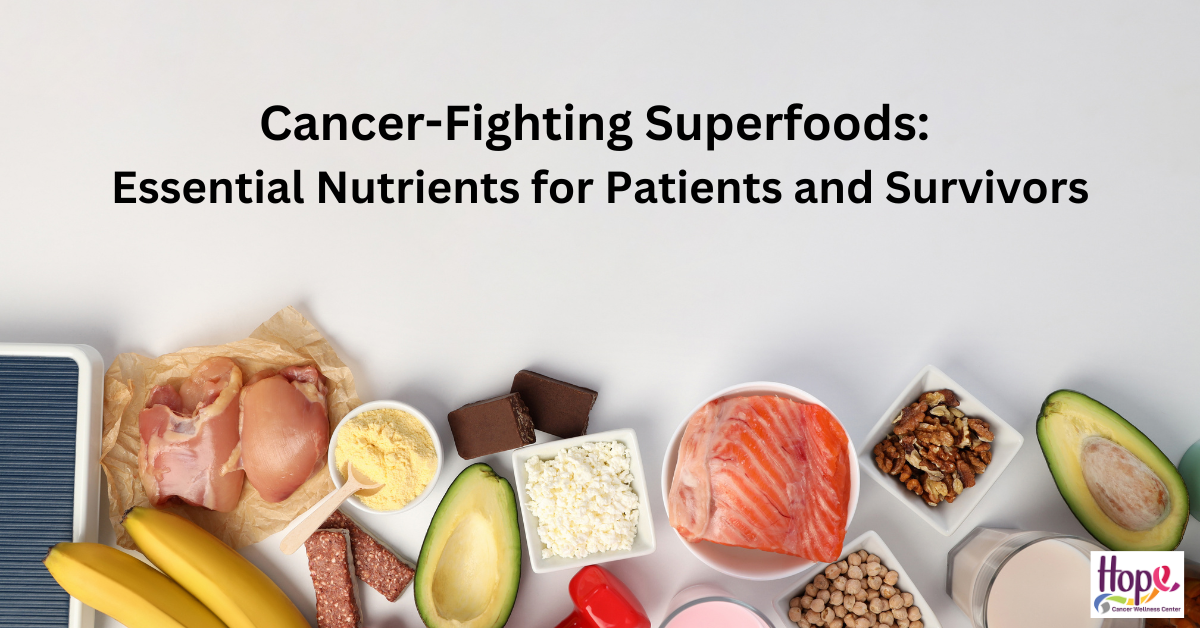
Cancer-Fighting Superfoods: Essential Nutrients for Patients and Survivors
Cancer-Fighting Superfoods play a crucial role in supporting the immune system, reducing inflammation, and promoting overall well-being for cancer patients and survivors. The right foods can help the body fight disease, improve energy levels, and aid in recovery after treatment.
This guide explores the top cancer-fighting superfoods, their benefits, and how to easily incorporate them into your diet.
Why Nutrition Matters During and After Cancer Treatment
Proper nutrition is essential for maintaining strength, supporting immune function, and reducing treatment side effects. Many Cancer-Fighting Superfoods contain powerful antioxidants, vitamins, and minerals that help protect cells and promote healing.
For cancer patients and survivors, a diet rich in whole, nutrient-dense foods can:
✅ Reduce inflammation and oxidative stress
✅ Support a healthy immune system
✅ Aid digestion and reduce treatment side effects
✅ Boost energy and promote overall wellness
Top Cancer-Fighting Superfoods and Their Benefits
1. Berries: Antioxidant Powerhouses
Berries like blueberries, strawberries, and raspberries are packed with antioxidants, which help fight free radicals that can damage cells. They also contain fiber to support digestion.
👉 How to eat them: Add berries to smoothies, oatmeal, or yogurt for a delicious and nutritious boost.
2. Leafy Greens: Nutrient-Dense and Detoxifying
Spinach, kale, and Swiss chard are loaded with vitamins A, C, and K, as well as phytonutrients that support cell health. Leafy greens also help detoxify the body and reduce inflammation.
👉 How to eat them: Toss into salads, blend into smoothies, or sauté with olive oil and garlic.
3. Cruciferous Vegetables: Natural Cancer Fighters
Broccoli, cauliflower, Brussels sprouts, and cabbage contain sulforaphane, a compound known for its cancer-fighting properties. These vegetables also help balance hormones and support liver detoxification.
👉 How to eat them: Roast, steam, or stir-fry for a flavorful and nutritious side dish.
4. Fatty Fish: Omega-3s for Inflammation Control
Salmon, mackerel, and sardines are rich in omega-3 fatty acids, which help reduce inflammation and support heart and brain health. Omega-3s are essential for cancer patients recovering from treatment.
👉 How to eat them: Grill, bake, or add to salads for a healthy protein option.
5. Turmeric: A Powerful Anti-Inflammatory Spice
Turmeric contains curcumin, a compound with strong anti-inflammatory and antioxidant properties. It has been studied for its potential role in slowing cancer cell growth.
👉 How to eat it: Add turmeric to soups, teas, or golden milk for a healing boost.
6. Nuts and Seeds: Healthy Fats and Protein
Almonds, walnuts, chia seeds, and flaxseeds are rich in healthy fats, fiber, and plant-based protein. They also contain lignans and antioxidants, which support overall health.
👉 How to eat them: Sprinkle on oatmeal, yogurt, or salads for added crunch and nutrition.
7. Garlic and Onions: Immune-Boosting Foods
Garlic and onions contain sulfur compounds that support the immune system and help detoxify the body. Studies suggest they may reduce the risk of certain cancers.
👉 How to eat them: Add to soups, stir-fries, or roasted vegetables for flavor and health benefits.
8. Legumes: Plant-Based Protein and Fiber
Beans, lentils, and chickpeas are high in fiber and protein, helping to stabilize blood sugar and support gut health. They also contain phytochemicals that may help protect against cancer.
👉 How to eat them: Make hummus, add to soups, or enjoy in salads for a filling meal.
9. Green Tea: A Cancer-Fighting Beverage
Green tea is loaded with catechins, antioxidants that help protect cells and support immune function. It has been studied for its potential in reducing cancer risk and supporting overall health.
👉 How to drink it: Enjoy hot or iced with a squeeze of lemon for extra benefits.
10. Whole Grains: Energy-Boosting and Fiber-Rich
Brown rice, quinoa, and oats provide essential nutrients and fiber, which help with digestion and sustained energy levels. Whole grains also contain selenium and B vitamins, important for cellular repair.
👉 How to eat them: Swap white rice for brown rice or quinoa and enjoy oatmeal for breakfast.
Simple Ways to Incorporate Cancer-Fighting Superfoods into Your Diet
Eating a nutrient-rich diet doesn’t have to be complicated. Here are some easy ways to include Cancer-Fighting Superfoods in your daily meals:
✔ Start your day with a berry smoothie with spinach and flaxseeds.
✔ Snack on nuts and seeds for healthy fats and protein.
✔ Add cruciferous vegetables to stir-fries and soups.
✔ Drink green tea instead of sugary beverages.
✔ Incorporate turmeric into meals for its anti-inflammatory benefits.
Final Thoughts
A diet rich in Cancer-Fighting Superfoods can help cancer patients and survivors feel stronger, support recovery, and promote long-term health. By making small, mindful changes to your daily nutrition, you can give your body the nourishment it needs to heal and thrive.
Need More Support?
If you or a loved one is navigating cancer recovery and would like personalized nutrition guidance, we’re here to help. Contact us at homeofhopeonline.org/contact to learn more about our support services.
